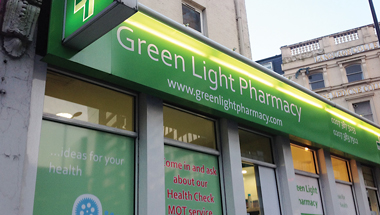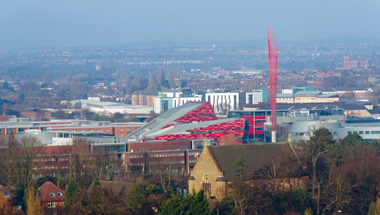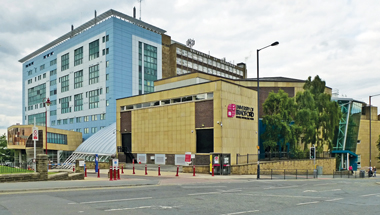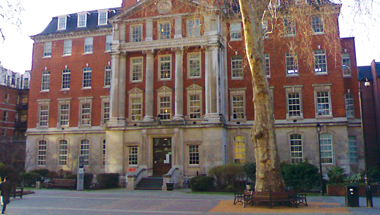The pharmacy simulator
The lack of practical experience among students inspired independent pharmacy group Green Light to set up a teaching centre that simulates life in a real pharmacy
What do you remember from your student days? The wild nights in the student union bar? The drone of your tutor as you sat in a musty lecture hall? Or perhaps the frantic last-minute cramming for your exams has stuck with you the most.
But be honest: how many times did you actually talk to a patient before you reached your pre-registration year? Chances are you could count the number of times on one hand. Because, like it or not, pharmacy is lagging behind many other healthcare professions in terms of patient-facing training. While medical colleagues are expected to hone their patient manner through regular interaction in their student years, much of pharmacy training focuses on the theoretical rather than the practical.
For Simon Harris, pharmacist and training lead at Green Light Pharmacy in Euston, London, this balance is entirely wrong. While training pre-registration students, he started to spot a pattern – they were all "very nervous" talking to patients. He wasn’t the only one to notice. When the pharmacy started to form a relationship with the nearby University College London (UCL) School of Pharmacy 10 years ago, Green Light staff and lecturers alike noticed a “disconnect between academia and practice”, says Mr Harris. Simply put, many students’ interactions with patients “just weren’t good”. “They’d never had to think about phrasing things in a patient-friendly way,” he explains.
The Green Light pharmacy team decided to do something about the problem. It channelled the frustration with gaps in pharmacy training into transforming the “dirty, damp” basement of the pharmacy into a teaching space for students. It was the start of a groundbreaking collaboration with UCL that made it the first and only teaching pharmacy in the UK – a title it still holds. Green Light was formally recognised for its efforts last December, when Health Education North Central and East London handed it a quality award for collaboration and partnership in health education, extolling the virtues of its “innovative and cutting-edge” training of pharmacy students.
Visiting the pharmacy, it’s easy to see why the scheme has attracted this praise – not only are students motivated, but Green Light’s teaching method has also secured the trust of patients.

How does the pharmacy teaching centre work?
Green Light Pharmacy’s project was partially funded by UCL, which contributed to the costs of building the pharmacy’s teaching space. The university also pays the pharmacy team for the time it spends teaching the students.
While students are responsible for dispensing medication themselves, they are supervised at all times by two Green Light pharmacists and one lecturer from UCL.
The project aims to replicate the pharmacy working environment as realistically as possible. Green Light's Simon Harris (pictured below) explains the pharmacy is uncompromising in its attitude towards professionalism – conscious that students are representing not only their university, but also the pharmacy.
Students are expected to adhere to a strict dress code, and any who arrive more than 10 minutes late aren’t allowed to enter. “We have very high standards for them and the school supports that,” stresses Mr Harris.
A clinical environment
At first glance, it clear to see that the initiative has come a long way from its beginnings as a dank basement. Two years ago, Green Light started offering practical teaching sessions in the space to groups of UCL students, which meant the environment had to mirror an actual pharmacy as much as possible.
The physical elements of a pharmacy are all there – the underground centre is complete with a consultation room, over-the-counter (OTC) medicines that students can “open and play with”, as well as prescription drugs. Unlike the lecture environment, there is no room for nodding off. Green Light expects pupils to take on an active role in the pharmacy – teaching them how to check prescriptions, hand over medication and effectively interact with patients. “We’re giving them real prescriptions, real invoices and ... real registers. And so it’s making it [pharmacy practice] more realistic,” Mr Harris explains.
This learn-by-doing approach aims to ensure students develop “good habits” from the very beginning of their careers. At Green Light, pupils are encouraged to act as if they are practising pharmacists – they can’t amend or cross out any mistakes on controlled drug registers, for example. Mr Harris has witnessed the effects of this practical approach on students. By knowing that the methadone they dispense, for example, will go to an actual patient, they gain a sense of responsibility. This has made them more focused on accuracy, Mr Harris says. “Initially, they were saying, ‘Yeah, I think that’s about right’. But [I said], ‘Do you think ‘about right’ is OK?’,” he explains.
Universal benefits
Mr Harris believes these principles are important to instil in students at an early stage – pointing to his group of second-year students as proof. This the first cohort of students to have gone through the Green Light process from the beginning of the pharmacy degree, and Mr Harris says he’s noticed a stark contrast in their behaviour compared to other students. They feel more comfortable with practical tasks because, crucially, pharmacy is not an “alien environment” to them anymore.
Feedback from students indicates they are also feeling these benefits. “There was a group just now saying there needs to be more of this [type of training],” Mr Harris says. Their enthusiasm is partly down to the fact that Green Light’s approach is so different from the theory-based learning they’ve come to expect. Mr Harris says much of the pharmacy degree is theoretical, which simply “isn’t so much fun”.
Students may also relish the edge the training gives them in the competitive jobs market. Mr Harris believes their CVs will be boosted by their experience in a real-life pharmacy, which means potential employers will not have to spend so much time on training. “Their communication skills are there, their counselling skills are there, and they’re not seeing [examples of good practice] from lecturers, they’re seeing it from practising pharmacists,” he says.
Education innovation
Innovative teaching techniques are cropping up across UK pharmacy schools
|
The University of Nottingham: Fourth-year pharmacy students work in teams of six to simulate all areas of running their own pharmacy business, from health campaigns to medicines sales. |
University of Bradford: Trainee pharmacists at Bradford can practice their skills on a patient simulator and have access to the on-site Weldrick’s pharmacy and hospital ward, where they can interact with patients. |
King’s College London: The university’s drug control centre is the only accredited anti-doping lab in the UK, and was used for the London 2012 Olympic and Paralympic Games. |
Patient backing
The only potential for negativity around the scheme could be from patients. We all know the barely-concealed horror we feel when faced with a student hairdresser – so how do patients feel about students being in control of something as important as their health? It could be a recipe for disaster but, as Mr Harris says, the opposite is true.
In fact, Green Light is proud to publicise that it is a teaching pharmacy and invites questions from the public. The result, he says, is that many say they are “impressed” with the unique teaching model and happy to talk to the students.
This is perhaps aided by Green Light’s close proximity to London teaching hospitals. Patients are used to being around medical students during hospital stays and trips to the GP, and are therefore happy for pharmacy students to dispense their medication and have input into their care, says Mr Harris.
Looking ahead
This positivity from patients will be vital to the next stage of the project. Mr Harris stresses that the initiative never stays still – it is constantly evolving – and there are some notable changes on the horizon. The Green Light team is hoping to build a counter in the basement, which will allow fourth-year students to sell OTC medicines from what will essentially be their own pharmacy.
Under the plans, students will respond to real patients with real symptoms by advising them on the range of OTC medicines available. Patients will also be able to visit the student pharmacists in the consultation room for services such as MURs, which will be conducted under supervision.
The development of the project won't just come from Green Light. Mr Harris is sure his won’t be the only teaching pharmacy for long – the model has caught the eye of other pharmacy schools the world over, with lecturers from the US, Australia and China stopping by to pay the team a visit.
It's clear to see why the project has attracted so much interest. Although it’s impossible to measure the success of the project before the first cohort of Green Light-trained students begin their pharmacy careers in earnest, the fact that it has the backing of universities, students and patients can only be a good sign.
For Mr Harris, the fact that his students will start their professional lives being able to interact and empathise with patients is a success in itself. “We look at people as being walking medicines, sometimes,” Mr Harris explains. “[But] it is a real person who is going to go home and use that medicine.”
Let’s hope this is one piece of advice the Green Light students will keep with them for the rest of their careers.







